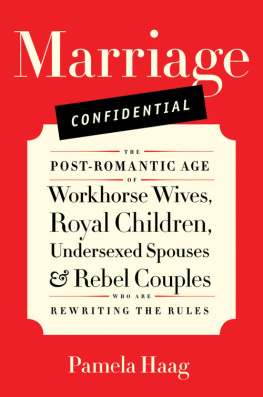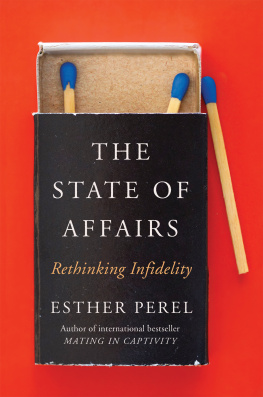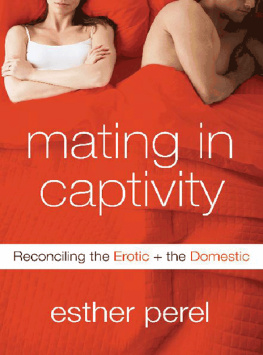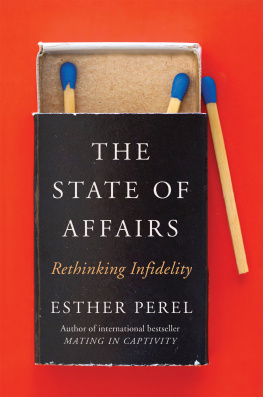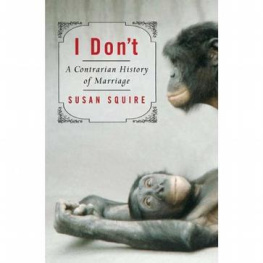Marriage Confidential
The Post-Romantic Age of Workhorse Wives, Royal Children, Undersexed Spouses & Rebel Couples Who Are Rewriting the Rules
Pamela Haag

Contents
Marriage on the Edge
The Dilemmas of a Semi-Happy Marriage
Why We Settle for Ambivalence
The New Normals of Career and Marriage
Life Partners
How Too Much Intimacy Killed Intimacy
I Can Bring Home the Bacon
How Having It All Became Sort of Having Two Things Halfway
The Tom Sawyer Marriage
The Plight of the New Workhorse Wife
The Joy of Falling
Downwardly Mobile and Mutually Liberated
Parenting Marriages
The Have ChildrenWill Divorce Paradox
How Parenthood Inspires Marriage and Then Steals It
Children: The New Spouses
How the Strength of Family Values Became the Weakness of Family
Man-Cave in the Promised Land
How Spouses Reclaim Their Adulthood by Acting Like Children
Marital Habitats
Being Married with Children in Public Again
New Twists on Old Infidelities, or,
the Way We Stray Today
Stories of the AFFAIRS Folder
The Underwhelming Crisis of Infidelity
I Call It Married Dating
The Accidental Cheater in the Age of Facebook and Google
ISO (In Search Of): A Bubble
The Philanderers Defense
The New Monogamy
The Fifty-Mile Rule
Affair Tolerators, Then and Now, or, the Dont Ask, Dont Tell Marriage
Were Making It Up as We Go Along
Sexual Libertarianism and the Case Against Marital Monogamy
A Place Where a Sick Marriage Goes to Die?
The Hidden World of Ethical Nonmonogamy
Free Love 2.0
The New Open Marriage
Why Cant We Have Our Cake and Eat It, Too?
Marriage on the Edge
A ndy is an acquaintance of my husband, John. He is in his early forties, very smart, inquisitive, and witty, and has a wonderful stay-at-home wife who looks after their two children. With my husband, however, Andy often drifts into frank comment about his marriage. When he does, he says things like this: What I need is an afternoon in a hotel room with a strange woman! But, of course, he doesnt take the steps to do that. Or hell say, Sometimes I ask myself, how am I going to get through the day without running over this woman? He looks at John intently before adding, And I mean it.
But of course he doesnt mean it, not really.
Despite his melodramatic outbursts, Andy is anything but a wife abuser or a nasty, hostile spouse. More accurately, hes dutiful and attentive, if a bit henpecked. His marriage is, by all accounts, functional, settled, and content. But at the same time, it is wistfully deficient in other ways, and glazed over with ennui. If pressed, he would say that it works well enough for him. But there are moments when Andy pensively, almost philosophically, wonders out loud: Is this as good as it gets?
My friend Laura, who has been married for over ten years, is similarly ambivalent. On one evening, she will ruefully ponder if she stays in her marriage only because she lacks the courage to divorce. On another, she will affirm her love and affection for her husband and speculate on the marriage as a gift of the constant in life; on another occasion she will reconstitute her sense of realism and duty, and say of marriage, For some of us, marriage is for better or worse. And if its worse, then its worse. Thats what you get.
Millions of wives and husbands have these feelings each day. They privately ask themselves a variation of the question Baltimore Orioles manager Earl Weaver used to put to his future Hall of Fame pitcher Jim Palmer, when Palmer was struggling in a game: Are you going to get any better, or is this it? They dont have an answer, but secretly they are troubled by a feeling that there is something in their marriage that doesnt work, possibly cannot be made to work, and that it is not going to get any better. As far as their marriages are concerned, they fear that this is, indeed, it. These spouses are sad more than miserable, disappointed more than chronically unhappy. As psychiatrists would say, their marriages are melancholy: They have a brooding sadness about them that often lacks an obvious, tangible cause.
These melancholy spouses may not remember the dream they once had for marriage, but the dream remembers them. It tugs at them hauntingly. They know its not their spouses fault, per se, or even their own. After several years, a Marriage is more like a third character, with its own personality and life. Its not reducible to the sum of its all-too-human creators, any more than a child would be.
I know these people well, as their thoughts are mine. If you too happen to be someone who has come to this uncomfortable realization about your marriage, you also know the drill that follows. You shadowbox with yourself. In quiet moments when you ask yourself, Is this all it is?, you simultaneously beat up on yourself for asking the question at all. You accuse yourself of being selfish to want more than you already have. You feel guilty thinking about lost or deferred dreams, and you wonder whether it is noble or useful to demand more from a marriage than the good things you have. You might even question your desires. Perhaps the longing for more out of marriage is just the vestige of a callow, self-defeating romantic ideal that you dont even entirely trust anymore, but cant entirely purge from your mind.
A few years ago I started casually asking women and men about their marriages, all the time. A common reaction was for a wife or husband to say, Im pretty satisfied with my marriage, but... , or Im happy, but... The gently inventoried deficits and suspended dreams that came after the but often sounded fairly serious and meaningful. It wasnt a matter of the toilet seat being left up, or of easily remedied flaws, but a collusive, ineffable shortcoming such as withered passion, boredom, lack of connection, lost affinities, or a world-weariness that beset their married life. Even so, they also felt, and I believed them, that they were more or less satisfied. They werent contemplating separation, despite the absences and the longings in their marriages. Those missing elements werent enough, apparently, to count as a source of legitimate unhappinessalthough they seemed serious enough that, after a while, I began to wonder why they didnt.
Mostly you live with genuine ambivalence and indeterminacy: One minute, you feel that your marriage is a good, solid thing; the next, you resent it and you think, how can I live with this person anymore? One minute you cant imagine staying; the next, you cant imagine leaving.
I m married to the prototype Great Guy and Wonderful Father to our child. And he really is. Youd like John. Everybody does. Hes an aggressively inoffensive man, with the soul of a mother hen in the body of a jock. On winter mornings, before dawn, he wakes up, jumps on his fancy German-designed stationary bike with electromagnetic resistance, and rides for hours. I can hear the bike roaring and humming so loudly from the floor below that youd think he intended to heat our house on the exertions of his famously sculpted legs. I was talking about your calf muscles with the mechanic at Joes garage the other day, a neighbor tells him. Remarkably, things like this are said to him by other married men.
Perhaps because he is a triathlete, a distance runner, and a long-distance cyclist, John understands endurance, and carries the slow-metabolizing, long view in his head. His life is paced to withstand discomfort and suffering over protracted stretches. Doubtless, this skill has come in handy in marriage.
John fixes things, mechanical and human. He does this even in his sleep. His dreams lean toward intricate capers in which he helps political prisoners escape from behind enemy lines or deploys technical ingenuity to outfox villains. His eyes light up when I present him with a loose cabinet hinge or a computer glitch he can solve for me. Sometimes he inquires after problems that Ive complained of ephemerally in the past. Did you ever get that keyboard drawer installed? hell ask hopefully. By disposition and profession he is an engineer, now a financial engineer who devises mathematical models for a commodities trading firm.
Next page
